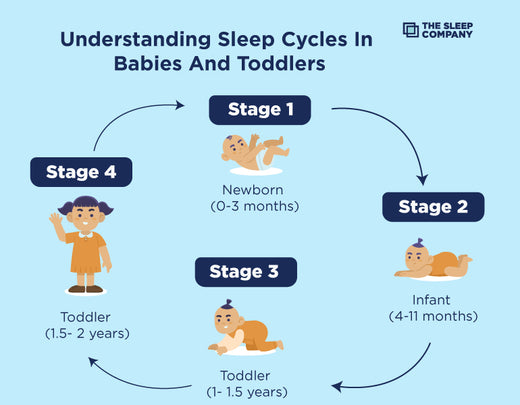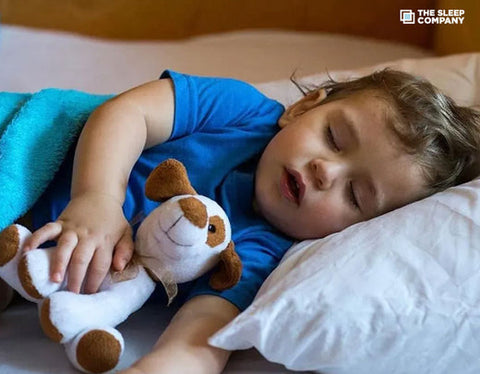My Cart

Understanding Sleep Cycles in Babies and Toddlers

If you are a new parent, it may sometimes feel like a struggle because babies don't have a fixed sleep pattern like adults. The inconsistent hours may leave you feeling super tired.
However, despite the erratic sleep cycle, your little one needs proper rest and sleep. It helps with their growth and development and supports their overall health.
The best way forward here is to actually understand their sleep cycles so you can prepare for the same. Knowing what and when to do can be a lifesaver.
Don't worry, we have got you covered. In this article, we unpack everything there is to know about sleep cycles in babies and toddlers so both you and your tiny human can slide into dreamland effortlessly.
How Long Should Your Baby Sleep at Every Stage?
Here’s a quick overview of how much sleep your baby needs. You can look at the number of hours they need and the approximate time they spend in each sleep stage.
| Age Group | Total Sleep (per 24 hours) | Nighttime Sleep | Daytime Naps | Sleep Stages | Light Sleep | Deep Sleep | REM Sleep |
|---|---|---|---|---|---|---|---|
| Newborn (0-3 months) | 14-17 hours | 8-9 hours | 7-9 hours (multiple naps) | Light Sleep, Deep Sleep, REM Sleep | About 50% | About 25% | About 25% |
| Infant (4-11 months) | 12-15 hours | 9-10 hours | 4-5 hours (2-3 naps) | Light Sleep, Deep Sleep, REM Sleep | About 45% | About 30% | About 25% |
| Toddler (1-2 years) | 11-14 hours | 11-12 hours | 1-2 hours (1-2 naps) | Light Sleep, Deep Sleep, REM Sleep | About 40% | About 30% | About 30% |
| Preschooler (3-5 years) | 10-13 hours | 10-12 hours | 0-1 hour (1 nap) | Light Sleep, Deep Sleep, REM Sleep | About 35% | About 30% | About 35% |
What Is a Sleep Cycle for Babies?
Baby sleep cycles include moving through different stages of sleep- REM, light sleep, and deep sleep.

1. Light Sleep
Light sleep is the initial stage of sleep where the baby transitions from wakefulness. It is easier to wake from this stage, and the baby may move or make noises.
2. REM Sleep
You must have noticed how even when your little one snoozes, their eyes move slightly under the eyelids. Also known as REM, this is the stage when babies dream. Here, the brain is very active and helps with learning and development. Babies spend the most time in the REM sleep stage.
3. Deep sleep
Deep sleep is when babies don't move much and remain calm as they snooze. This stage helps with growth and healing.
Understanding Sleep Cycles In Babies and Toddlers
Now, let’s dig deep and learn more about the sleep cycles in babies and toddlers.

1. Newborn Sleep
If you have a newborn, their sleep can be unpredictable. For the first few weeks, expect your baby to sleep 14-17 hours a day. However, this takes place in short bursts of 2-4 hours at a time.
Newborns don't have a set day-night schedule and may wake up frequently for feedings. Also, they may spend a lot of time in light sleep, which means they might stir, move, or make noises while sleeping. Their sleep pattern will also keep changing for the next few months.
2. 2-3 Months: What to Expect from Baby Sleep
Let's take a look at a 2-month-old baby's sleeping pattern.
Here, a 2-month-old baby sleeps for longer stretches at night for around 4-6 hours. While they have overcome the newborn stage, they still need a lot of sleep and will enjoy a slumber for about 14-17 hours in total each day. If you were wondering how much sleep do infants need, now you have the answer.
At this age, your little one will take plenty of naps during the day. These naps can last anywhere between 30 minutes to 2 hours.
But the good news is that they tend to develop a slightly predictable sleep pattern. To make sure your sleep isn't compromised, it is best to embrace your 2-month baby sleeping hours.
3. Around 3 Months: What to Expect from Baby Sleep
In just one month, a lot can change. At around 3 months, your baby's sleep may start to become more regular. While they will continue to sleep for about 14-16 hours a day, the nighttime sleep becomes longer and can go up to 6 hours at night.
Even their daytime naps become more predictable. This is because your tiny human is starting to learn the difference between day and night.
That said, every baby is different, so sleep patterns can vary. Also, you may still be interrupted by feedings or diaper changes.
4. 3-6 Months: What to Expect from Baby Sleep
By 3-6 months, your baby’s sleep time becomes more consistent. You can now enjoy your complete sleep as well. Here, babies often sleep 12-15 hours a day and their nighttime sleep can even go up to 8 hours.
At this stage, the baby’s sleep patterns are starting to develop a regular rhythm and may begin sleeping through the night. Having a bedtime routine, like a bath or story, can be incredibly helpful.
5. 6-12 Months: What to Expect from Baby Sleep
If you have had sleep struggles, a 6 month baby’s sleeping hours will make you happy.
Between 6-12 months, your little one will enjoy a long slumber for about 12-14 hours a day. Just at night, they may sleep about 10-12 hours and even the wake-ups go down. Daytime naps usually happen 2-3 times a day.
6. Toddlers: When and How Much They Sleep
Toddlers are almost adjusted to a sleep routine and will need about 11-14 hours. They enjoy a long slumber at night for about 10-12 hours at night and take 1-2 hour naps during the day. Naps are usually limited to one.
That said, this is the age where your little one might resist bedtime or wake up during the night due to fears or separation anxiety. A soothing bedtime routine is great.
How Do Baby Sleep Patterns Differ from Adult Sleep Patterns?
When we compare sleep time between adults and children, the sleep patterns differ in several ways.
Babies have shorter sleep cycles, which is about 50-60 minutes, compared to adults who have cycles of 90 minutes.
Babies spend more time in REM sleep, which helps with brain development, while adults have more deep sleep.
Also, as a new parent, you are probably already familiar with this but babies wake up more frequently during the night because their sleep is lighter and they need to eat or be comforted.
How Baby Sleep Patterns Affect Grown-Ups?
Baby sleep time and patterns also affect adults. Since babies have shorter sleep cycles and wake up more often, you may have to get up frequently to feed, change, or comfort them.
While cuddling your little one can always feel good, the many breaks in your sleep can lead to sleep deprivation. And, of course, this can make you tired and less productive during the next day.
Sleep deprivation can also impact your mood, energy levels, and eventually your health. Therefore, a sleep routine for the baby is important. It not only helps them enjoy a sweet slumber but also you.
Common Baby Sleep Concerns and Solutions
Understanding the common sleep concerns and their solutions can help ensure your little one enjoys a wholesome sleep every time. Take a look!

1. Difficulty Falling Asleep
This is one of the most common concerns parents have. Right from a young age, it is important to establish a consistent bedtime routine for your little one to ensure they easily fall asleep.
Make sure you create a comfortable and calming environment with a proper baby mattress and bedding. Also, avoid overstimulation before bed.
2. Frequent Night Wakings
Here, you can consider sleep training methods like the Ferber Method, Chair Method, and more to help you out.
You can even offer a security object that is safe to help them go back to sleep easily on their own.
3. Short Naps
While naps are necessary, you must also have a consistent nap schedule for your baby. Even for naps, make sure you create a dark, quiet nap environment.
You can use noise machines to block out any distractions as well. Pay attention to your baby’s sleep cues, like rubbing eyes or yawning, to help time naps well.
4. Early Morning Waking
If your baby tends to wake up early frequently, you can adjust their bedtime to be slightly earlier. Make sure their room is dark. You can use blackout curtains if needed.
Also, try to delay their morning feed by a little bit to encourage longer sleep.
5. Night-time Feedings
If your little one tends to wake up often for night-time feedings, gradually reduce the amount of milk you offer during the night.
Instead, focus on increasing daytime feedings so your baby gets enough during the day. You can also try to stretch the time between night-time feedings and help your baby learn to fall back asleep on their own.
6. Separation Anxiety
If your little one is dealing with separation anxiety, give your baby a familiar object like a favorite blanket or stuffed animal for comfort. However, make sure it is safe.
Also, avoid dragging out the departure, as quick and calm goodbyes help your baby feel more secure and make transitions easier.
7. Sleep Regressions
During sleep regressions, it’s important to stick to your baby’s regular sleep routines and be patient.
Make sure you offer extra comfort and reassurance to help them through this temporary phase. However, keep the bedtime consistent and create a calming environment for sleep.
Conclusion
Now you know everything there is to know about your child's changing sleep cycles. It can help you devise healthy sleep habits that benefit their overall health.
Remember, as your little one grows, their sleep patterns will also change. Slowly, they will enjoy more consolidated sleep with fewer disruptions.
However, what's essential for this is a comfortable sleep environment with a supportive mattress and bedding.
The Sleep Company brings you a Smart Mattress for your little one that helps them snooze with utmost comfort.
The Smart Baby Mattress is scientifically designed to support their spine development and growing bodies. It even comes with the Patented SmartGrid Technology that maintains your baby's natural posture throughout their slumber.
The material used is absolutely safe and offers a combination of comfort and durability. Some of the main features include:
- Hypoallergenic and skin-friendly fabric
- 100% waterproof protection
- Highly breathable with 2500+ air channels
- Perfect firmness as recommended by the American Academy of Pediatrics (AAP)
Give Your Child The Comfort They Deserve With The Smart Baby Mattress Today!
FAQs
Sleep cycles in babies and toddlers usually last 45-60 minutes. They consist of light sleep, deep sleep, and REM sleep. In fact, babies spend more time in REM sleep, which is essential for brain development. That said, these cycles slowly grow as they age.
Babies start to develop more regular sleep cycles around 3-6 months of age. As a matter of fact, by 6 months, many babies have longer stretches of sleep at night.
A typical sleep cycle for a new-born is for about 45-50 minutes. Whereas, for a toddler, it goes up to about 60-70 minutes.
A baby's sleep cycle has three main stages, which include light sleep, REM, and deep sleep. In light sleep, the baby may move, make noises, and wake up easily. In deep sleep, the baby is very still and harder to wake, and REM is where brain development takes place. These stages usually repeat about every 45-60 minutes.
Some of the common sleep disturbances in toddlers include nightmares, night terrors, and frequent waking during the night. They may also have trouble falling asleep, resist bedtime, or wake up too early.
A 2 month baby's sleeping time is about 14 to 17 hours a day.
A 5-month-old baby’s sleeping hour is about 12-15 hours of sleep a day.





























































